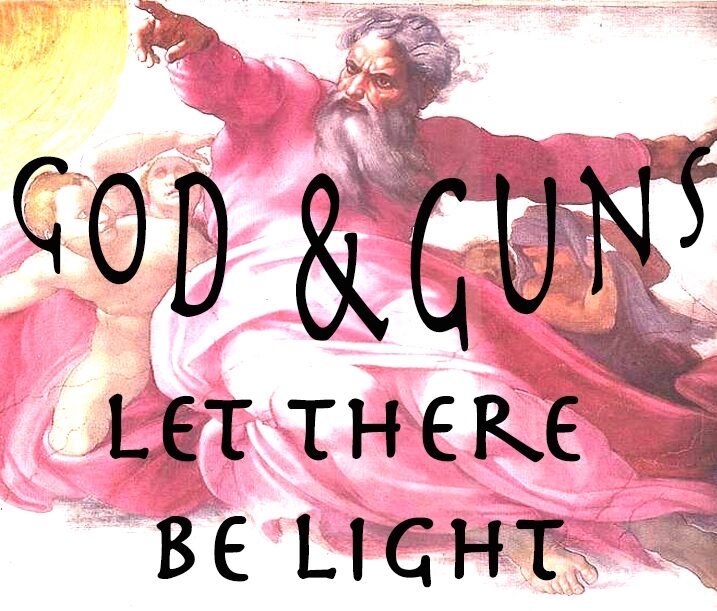Is God pro-gun? President Trump seems to think so. This week Trump attacked Joe Biden, saying that Biden is going to “take away your guns, destroy your Second Amendment, no religion, no anything. Hurt the bible, hurt God. He’s against God, he’s against guns.”
Trump gives voice to a prototypical American myth of a land that loves God, guns, and the gospel. You can see this mythic complex in cowboy movies and elsewhere. WWII gave us a song with the lyrics, “Praise the Lord and pass the ammunition and we’ll all stay free.” In 2009, Lynyrd Skynyrd released an album called “God & Guns.” The title track (covered recently by Hank Williams, Jr.) says, “God and guns keep us strong. That’s what this country was founded on.” The song seems to respond to something Barack Obama said about “bitter” and “frustrated” Americans who “cling to guns or religion.”
Of course, religious liberty and gun ownership are protected by the First and Second Amendments. But the subsequent case law is complicated and contentious. These complex Constitutional questions are not easily reduced to the simplistic idea that to be an American is to praise the Lord and pass the ammunition. The First Amendment gives you the right to worship God in your own way. It protects pacifists, atheists, and militant Christians The Second Amendment affirms the right to have a well-regulated militia and bear arms. It does not, however, help us interpret the Bible.
We live in a country where over a quarter of Americans (28%) believe that the Bible should take precedence over the will of the people, according the Pew Center. So, it is important to note that the Constitution allows Americans to disagree about the Bible.
The Bible is not a useful guide on the question of guns anyway. There is nothing in the Good Book about guns, which didn’t exist back then. The Bible talks a lot about swords. But to say that the Bible is pro-sword ignores those passages that suggest turning swords into plowshares (Isaiah 2:4). I’ve pointed out in my book on the Bible that for many issues, ancient Biblical texts are indeterminate and uninformative.
Of course, guns and swords are part of a larger question of self-defense. But the Bible is not a useful guide here either. Some texts show the Jewish people fighting for their survival. Paul wrote in his letter to the Romans that the political authorities use the sword to execute justice. But Jesus told Peter to put away his sword. And Christian martyrs often followed Jesus’s model and submitted to execution.
Some Christians are pacifists. Others are not. And the Bible is ambiguous.
A recent book by Michael Austin, God and Guns in America, reminds us of the diversity of Christian belief about guns. Austin suggest that some Christians hate guns and love God. But others love guns and love God. I would add that even atheists disagree: some hate guns others don’t.
That’s why we ought to keep these issues separated, just as the First and Second Amendments are distinct. On the one hand, religious liberty permits us to interpret the Bible any way we want. On the other hand, there is the question of self-defense and the “well-regulated militia.” The issues of legal self-defense and justified violence are complicated enough on their own, without conflating them with unanswerable questions about the Bible.
But most public argument about this stuff lacks subtlety. Political slogans, popular music, and prophetic preaching are typically not bastions of critical thinking. Art and politics pull emotional levers by using affective language and making vague gestures. Religion does that too, much of the time. But critical thinking asks us to analyze arguments and carefully excavate the historical sources.
Smart people continue to debate the Bible and the Constitution while reaching divergent conclusions. That’s why it is hard to take Trump seriously when he says Biden will hurt God and the Bible. The Constitution prevents any President—whether Trump or Biden—from taking unilateral action on any of these issues. And if there is a God, He can probably take care of Himself.


